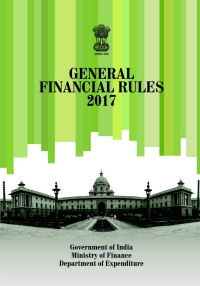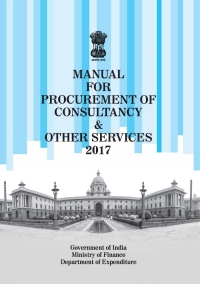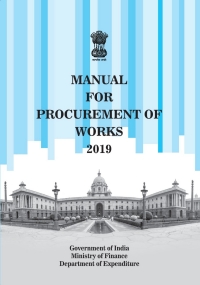ᱜᱤᱮᱯᱷᱹᱟᱨ ᱠᱩ 2017 ᱫᱚ ᱞᱟᱛᱟᱨ ᱞᱮᱠᱟ ᱛᱮ 5 ᱨᱚᱠᱚᱢ ᱨᱮᱭᱟᱜ ᱱᱤᱣᱤᱫᱟ ᱠᱩ ᱯᱚᱨᱤᱵᱷᱟᱥᱤᱛ ᱟᱠᱟᱫᱟ:
i. ᱵᱤᱜᱭᱟᱯᱤᱛ ᱱᱤᱣᱤᱫᱟ ᱛᱚᱞᱟᱥ
ᱵᱤᱜᱭᱟᱯᱚᱱ ᱫᱟᱨᱟᱭ ᱛᱮ ᱱᱤᱣᱤᱫᱟ ᱠᱩ ᱞᱟᱹᱜᱤᱫ ᱥᱟᱢᱲᱟᱣ ᱨᱮᱭᱟᱜ ᱵᱮᱵᱷᱟᱨ ᱫᱚ ᱚᱱᱩᱢᱟᱱᱤᱛ ᱡᱤᱥᱤᱥ ᱞᱟᱹᱜᱤᱫ ᱥᱚᱭᱫᱟ ᱨᱮᱭᱟᱜ ᱜᱚᱱᱚᱝ ᱫᱚ 25 ᱞᱟᱠᱷ ᱴᱟᱠᱟ ᱟᱨ ᱚᱱᱟ ᱠᱷᱚᱱ ᱵᱟᱲᱤ ᱦᱚᱭ ᱫᱟᱲᱤᱭᱟᱜ-ᱟ. In such cases, the tender enquiry should be advertised on the Central Public Procurement Portal (CPPP) at www.eprocure.gov.in and on GeM. An organisation having its own website should also publish all its advertised tender enquiries on the website.
ii. ᱥᱤᱢᱤᱛ ᱴᱮᱸᱰᱚᱨ ᱛᱚᱞᱟᱥ
In a limited tender enquiry, various vendors (more than three) are empaneled by the Government Department for goods that are procured regularly by the Department. ᱡᱟᱣ ᱜᱮ ᱥᱤᱢᱤᱛ ᱴᱮᱱᱰᱚᱨ ᱨᱮᱭᱟᱜ ᱠᱩᱠᱞᱤ ᱫᱚ ᱛᱚᱠᱷᱚᱱ ᱟᱯᱱᱟᱨᱟ ᱡᱚᱠᱷᱚᱱ ᱥᱚᱭᱫᱟ ᱫᱟᱲᱤᱭᱟᱜ ᱡᱤᱱᱤᱥ ᱨᱮᱭᱟᱜ ᱚᱱᱢᱟᱱᱤᱛ ᱜᱚᱱᱚᱝ 25 ᱞᱟᱠᱷ ᱴᱟᱠᱟ ᱠᱷᱚᱱ ᱠᱚᱢ ᱛᱟᱦᱮᱱᱟ.
iii. Two-Stage Bidding
For purchasing high-value plant, machinery, etc. of a complex and technical nature, bids may consist of two parts, as below:
ᱚ. ᱛᱟᱠᱱᱤᱠᱤ ᱵᱳᱞᱤ ᱡᱟᱦᱟᱱ ᱨᱮ ᱫᱚ ᱣᱮᱵᱥᱟᱭᱤᱠ ᱱᱤᱭᱚᱠ ᱠᱩ ᱟᱨ ᱥᱚᱨᱛ ᱠᱩ ᱥᱚᱛᱮᱜ ᱡᱚᱛᱚ ᱛᱟᱠᱱᱤᱠᱤ ᱵᱤᱣᱨᱚᱱ ᱥᱮᱞᱮᱫ ᱢᱮᱱᱟᱜ-ᱟ; ᱟᱨ
ᱛ. ᱛᱟᱠᱱᱤᱠᱤ ᱵᱳᱞᱤ ᱨᱮ ᱚᱞ ᱟᱠᱟᱱ ᱡᱤᱱᱤᱥ ᱠᱩ ᱞᱟᱹᱜᱤᱫ ᱜᱚᱱᱚᱝ ᱨᱮᱭᱟᱜ ᱥᱚᱱᱠᱮᱛ ᱣᱤᱛᱤᱭ ᱵᱳᱞᱤ.
iv. ᱵᱮᱜᱟᱨ ᱴᱮᱱᱰᱚᱨ ᱛᱚᱞᱟᱥ
ᱱᱚᱣᱟ ᱯᱚᱨᱤᱥᱛᱷᱤᱛᱤ ᱠᱩ ᱨᱮ ᱮᱠᱚᱞ ᱧᱟᱢᱚᱜ ᱡᱟᱭᱜᱟ ᱠᱷᱚᱱ ᱥᱚᱭᱫᱟ ᱨᱮᱭᱟᱜ ᱜᱚᱲᱚ ᱦᱟᱛᱟᱣ ᱫᱟᱲᱤᱭᱟᱜ-ᱟ:
ᱚ. ᱡᱚᱠᱷᱚᱱ ᱮᱠᱮᱱ ᱢᱤᱛ ᱵᱤᱥᱮᱥ ᱯᱷᱹᱟᱨᱢ ᱞᱟᱜᱛᱤᱭᱟᱜ ᱡᱤᱱᱤᱥ ᱠᱩ ᱨᱮᱱ ᱥᱤᱨᱡᱚᱱᱤᱡ ᱮ ᱦᱩᱭᱤᱜ-ᱟ, ᱛᱚᱵᱮ ᱥᱟᱦᱟᱸᱣ ᱛᱮᱭᱟᱜ ᱥᱚᱨᱠᱟᱨᱤ ᱵᱤᱵᱷᱟᱜ ᱨᱮ ᱡᱚᱛᱚ ᱠᱷᱚᱱ ᱥᱚᱨᱮᱥ ᱜᱤᱭᱟᱱ ᱞᱟᱹᱜᱤᱫ.
ᱠᱷ. ᱟᱯᱟᱛᱠᱟᱞ ᱢᱟᱢᱞᱟ ᱨᱮ, ᱡᱚᱠᱷᱚᱱ ᱡᱟᱦᱟᱱ ᱵᱤᱥᱮᱥ ᱧᱟᱢᱚᱜ ᱡᱟᱭᱜᱟ ᱠᱷᱚᱱ ᱞᱟᱜᱛᱤᱭᱟᱜ ᱡᱤᱱᱤᱥ ᱥᱚᱭᱫᱟ ᱞᱟᱜᱛᱤ ᱦᱩᱭᱩᱜ-ᱟ. In such cases, the reason for such a decision must be recorded, and approval of competent authority must be obtained.
c. When specific standardised machines or spare parts have to be acquired in order to be compatible with existing sets of equipment (on the advice of a competent technical expert and approved by the relevant authority).
v. ᱤᱞᱮᱠᱴᱨᱳᱱᱤᱠ ᱨᱤᱣᱨᱥ ᱱᱤᱞᱟᱢᱤ
An Electronic Reverse Auction is a type of online auction in which the traditional roles of buyer and seller in an auction are reversed. ᱢᱤᱛ ᱥᱟᱫᱷᱟᱨᱚᱱ ᱱᱤᱞᱟᱢᱤ ᱨᱮ, ᱥᱚᱭᱫᱟ ᱦᱚᱲ ᱵᱟᱲᱛᱤ ᱦᱩᱭ ᱞᱮᱱ ᱨᱮ ᱫᱚᱨ ᱠᱩ ᱨᱮᱭᱟᱜ ᱯᱮᱥᱠᱚᱥ ᱠᱮᱛᱮᱡ ᱡᱤᱱᱤᱥ ᱠᱩ ᱟᱨᱵᱟᱝᱠᱷᱟᱱ ᱥᱮᱣᱟ ᱠᱩ ᱧᱟᱢ ᱞᱟᱹᱜᱤᱫ ᱯᱚᱨᱛᱤᱮᱥᱯᱟᱨᱫᱷᱟ ᱦᱩᱭᱩᱜ-ᱟ. Conversely, in an electronic reverse auction, there is one buyer and many potential sellers. The sellers compete to obtain business from the buyer, and prices will typically decrease as the sellers underbid each other.



















